The People v Donald Trump: Inside the first-ever criminal trial of an American president
Donald Trump’s first criminal trial before election day is about more than hush money. Prosecutors allege a scheme to corrupt a presidential election. Alex Woodward reports

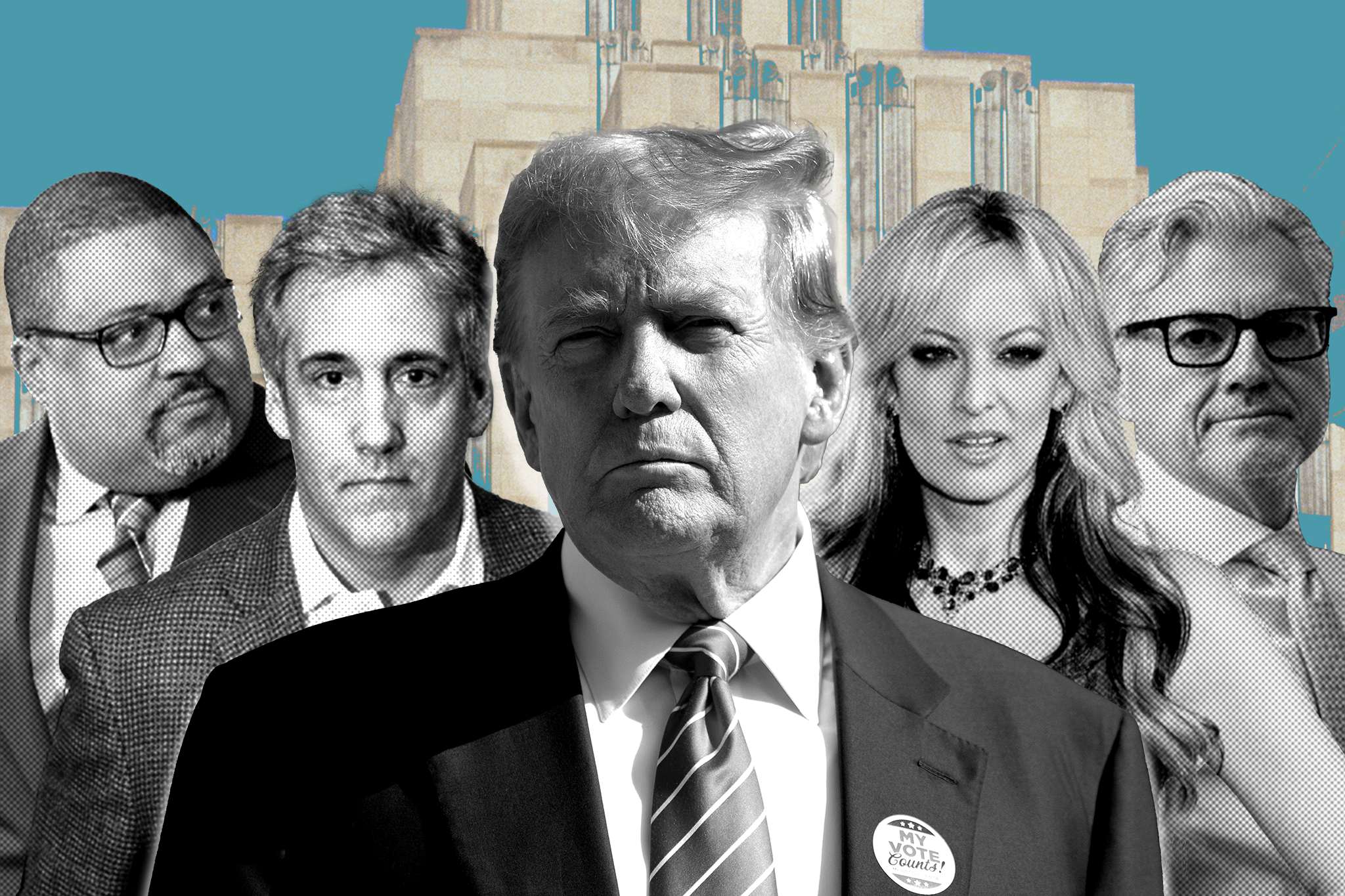
Your support helps us to tell the story
From reproductive rights to climate change to Big Tech, The Independent is on the ground when the story is developing. Whether it's investigating the financials of Elon Musk's pro-Trump PAC or producing our latest documentary, 'The A Word', which shines a light on the American women fighting for reproductive rights, we know how important it is to parse out the facts from the messaging.
At such a critical moment in US history, we need reporters on the ground. Your donation allows us to keep sending journalists to speak to both sides of the story.
The Independent is trusted by Americans across the entire political spectrum. And unlike many other quality news outlets, we choose not to lock Americans out of our reporting and analysis with paywalls. We believe quality journalism should be available to everyone, paid for by those who can afford it.
Your support makes all the difference.In the weeks after he descended his beloved golden escalator from Trump Tower on Fifth Avenue to announce his presidential campaign in 2015, Donald Trump would arrange a scheme to bury compromising stories of his affairs to clear his path to the White House.
From that very same building, then candidate Trump allegedly orchestrated a plan to buy up damaging stories that threatened his candidacy, only to ensure they would never be published, and then reimbursed his attorney who paid off an adult film star whose story of an affair with the Republican nominee for the presidency threatened to derail his campaign.
Those reimbursements were allegedly falsified as business expenses – the crime at the centre of an alleged plot to influence the outcome of the 2016 election, one that will come into sharp relief during a weeks-long criminal trial in Manhattan that begins on 15 April.
The People of the State of New York v Donald J Trump is the first-ever criminal trial against an American president, falling in the middle of another election year, in a case that describes an attempt to manipulate the outcome of the election that launched him into political domination.
The case from Manhattan district attorney Alvin Bragg is the first among Mr Trump’s four criminal cases to go to trial, and likely the former president’s only criminal trial before November’s general election.
According to prosecutors, it’s an election interference case, one that predates the criminal schemes alleged by federal prosecutors and state attorneys in Georgia in cases targeting then President Trump’s attempts to overturn 2020’s results.
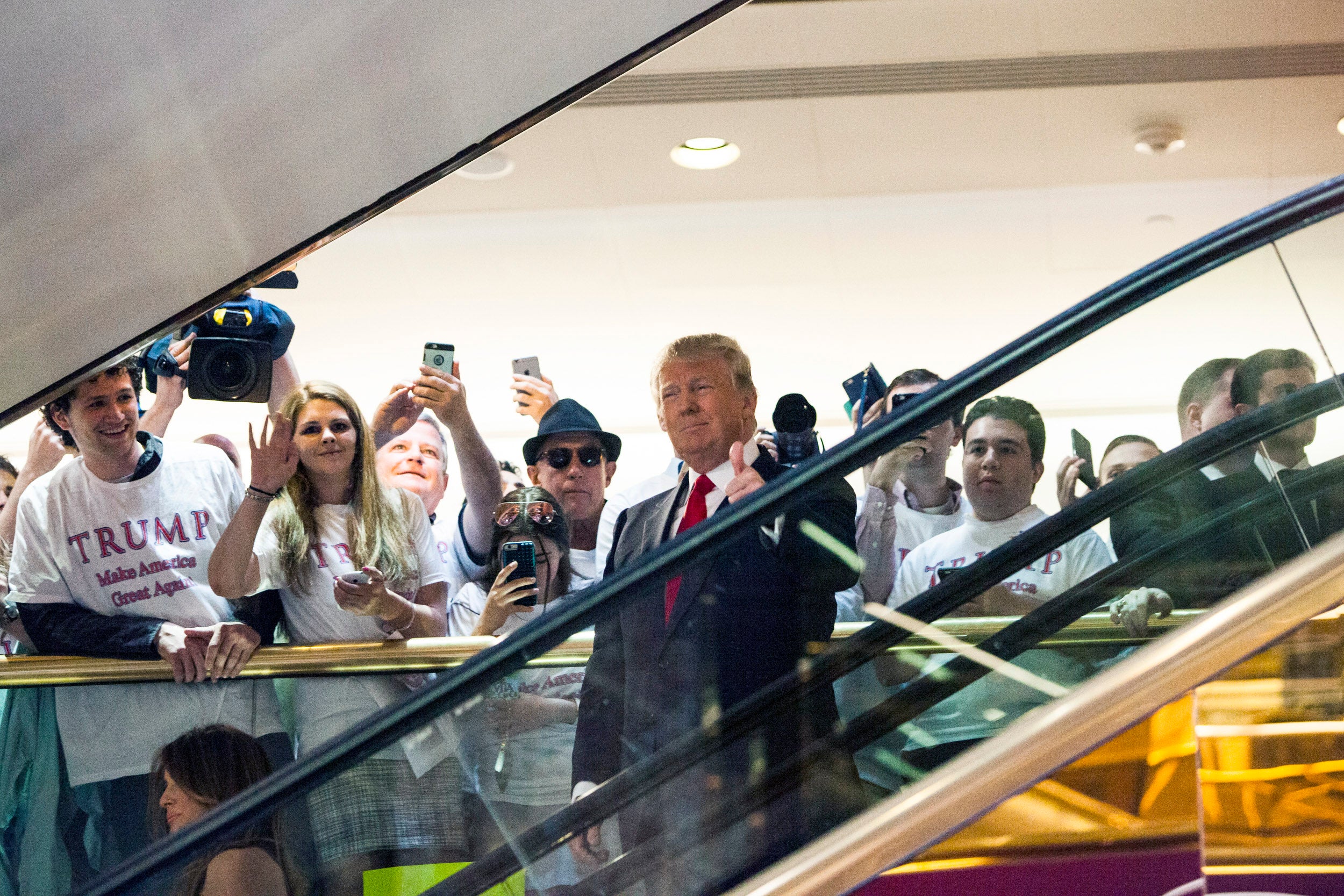
Mr Trump, meanwhile, has accused prosecutors and judges of waging election interference against him, and baselessly portrayed his mountain of legal obstacles as a Democratic-led conspiracy to keep him out of the White House.
While the sordid details of Mr Trump’s affairs and inner workings of his business empire will be relentlessly scrutinised out of court, Mr Bragg’s office has stressed that the case is relatively routine.
“We regularly do cases involving false business statements,” he told reporters when he announced a 34-count grand jury indictment against the former president last year.
“The basis for business integrity and a well-functioning business marketplace is true and accurate record-keeping,” he said. “That’s the charge that’s brought here: falsifying New York state business records.”
Prosecutors have grounded the case in a straightforward narrative: Mr Trump’s former attorney Michael Cohen paid $130,000 to Stormy Daniels to prevent her from speaking publicly about her affair with Mr Trump, who has denied ever having sex with her. Prosecutors allege that Mr Trump’s reimbursements were disguised as legal fees across 34 business records – 11 invoices, 11 cheques, and 12 ledger entries.
Those allegedly false records are misdemeanour crimes on their own. But Mr Bragg argues that those crimes were committed in service of another, elevating them to the more serious level of felonies.
In this case, that presumably includes violations of state and federal election laws – allegations that will rely heavily on testimony from Cohen, who has already served prison time after pleading guilty to violating campaign finance laws, tax evasion and lying to Congress, in a separate federal case that includes many of the claims in the case against his former boss.
The allegations largely revolve around the story of a candidate – whose campaign was wrestling with the release of the so-called Access Hollywood tape – desperate to keep his election chances afloat, and willing to cook his business books to do so.
That tape, recorded in 2005 and released just weeks before election day in 2016, captured Mr Trump saying that he “moved” on a female TV personality “like a b****”.
He can be heard saying on the tape: “I’m automatically attracted to beautiful – I just start kissing them. It’s like a magnet. Just kiss. I don’t even wait. And when you’re a star, they let you do it. You can do anything. Grab them by the p****. You can do anything.”
Mr Trump’s own wife Melania Trump called the comments “unacceptable and offensive”. Republican officials condemned him, began distancing themselves from his campaign and urged him to withdraw his nomination.
Manhattan prosecutors are hoping to explain to jurors that the tape’s release sparked “panic” within his campaign, underscoring the urgency to bury any other compromising stories that would damage his election prospects.
In a December radio interview, Mr Bragg emphasised that the case is not about “money for sex”.
“We would say it’s about conspiring to corrupt a presidential election,” he said. “And then lying in New York business records to cover it up.”
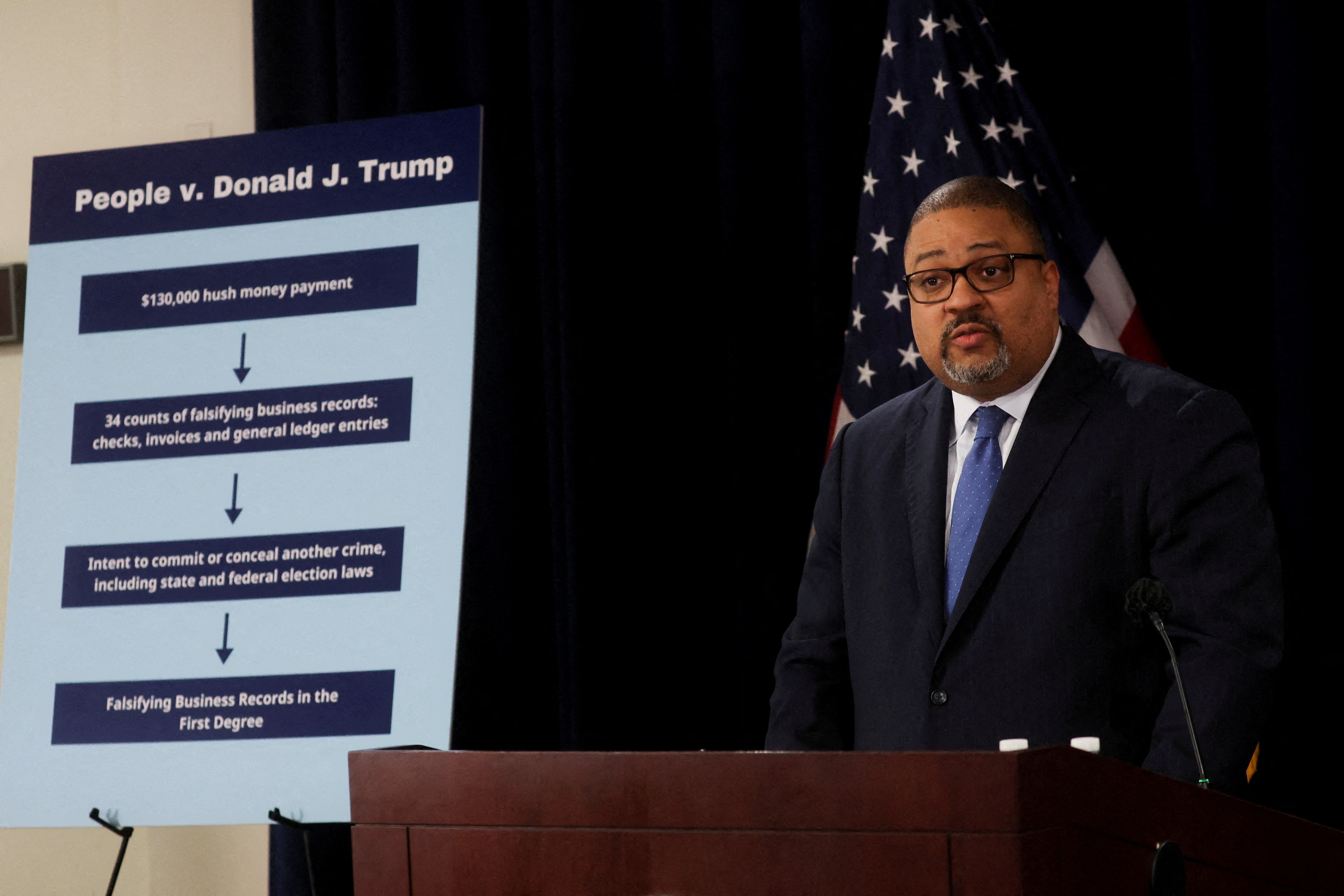
In his description of the case to prospective jurors, New York justice Juan Merchan also makes clear that the case involves an “unlawful” attempt to affect the outcome of the 2016 election.
He summarises that Mr Trump is accused of falsifying business records “to conceal an agreement with others to unlawfully influence the 2016 presidential election” and that “specifically, it is alleged that Donald Trump made or caused false business records to hide the true nature of payments made to Michael Cohen, by characterising them as payment for legal services rendered pursuant to a retainer agreement,” according to the judge’s summary.
Those payments to Ms Daniels allegedly sought to “prevent her from publicly revealing details about a past sexual encounter with Donald Trump”, he wrote.
“The charge of falsifying business records in the first degree is the bread and butter of New York’s white collar prosecutions,” according to Karen Agnifilo, a former chief assistant district attorney in Manhattan.
“What makes [falsifying records] a felony is the purpose with which you were doing it,” she said during a briefing with reporters last month. “If the reason is to commit, conceal, or aid in a crime, then that bumps it up to a felony. You don’t have to have actually committed the crime. You just have to have had the intention or purpose of doing it.”
The hush money scheme
In August 2015, then candidate Trump met with David Pecker – whose American Media Inc publishes the notorious American supermarket tabloid National Enquirer – to outline a “catch and kill” scheme to buy up negative stories, according to prosecutors.
American Media Inc agreed to pay a former Trump Tower doorman for exclusive rights to a story that Mr Trump allegedly fathered a child out of wedlock, then falsely characterised that payment in a ledger, according to prosecutors. After the story was determined to be bunk, Cohen pressed to keep it buried, prosecutors allege.
The following year, the National Enquirer told Cohen that Playboy model Karen McDougal alleged an affair with Mr Trump a decade earlier. She was ultimately paid $150,000 for her silence, allegedly based on an arrangement that Mr Trump would reimburse the publisher.
A subsequent recording of a conversation between Mr Trump and his then lawyer allegedly involves discussion of a plan to open a shell company – with help from Trump Organization chief financial officer Allen Weisselberg – to handle those transactions.
In September 2016, Mr Pecker allegedly agreed to transfer $125,000 to the shell company for the rights to her story, according to court documents.
On 7 October, 2016, one month before election day, The Washington Post published the Access Hollywood tape.
Three days later, American Media’s editor in chief Dylan Howard contacted Mr Pecker about another woman – Stormy Daniels – who also alleged an affair with Mr Trump, according to prosecutors. Cohen similarly negotiated a deal to pay her for the rights to the story.
Mr Trump, who allegedly tried to delay paying her roughly $130,000 until after the 2016 election, ultimately agreed to the arrangement, as long as Cohen and Weisselberg could handle it for him, according to prosecutors. Cohen agreed, expecting Mr Trump to pay him back.
Cohen transferred the money from his personal home equity line of credit into the shell company’s account, according to court documents.
On 8 November, 2016, Trump was declared the winner of the 2016 presidential election. Mr Pecker was invited to the inauguration, according to prosecutors.
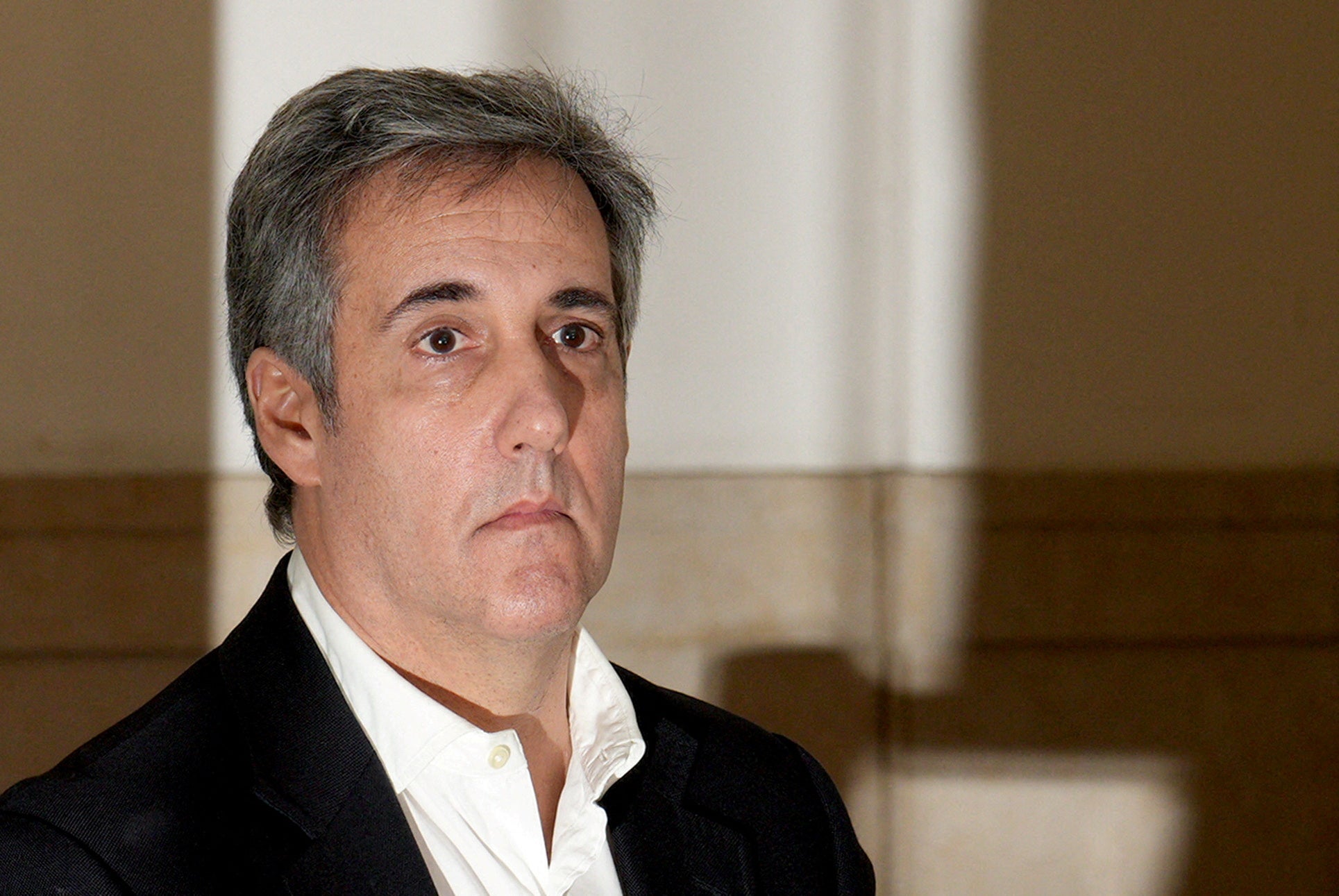
In January 2017, with his boss in the White House, Cohen met with Weisselberg to arrange his reimbursement along with his legal expenses and a year-end bonus, for a total of $420,000, prosecutors allege.
The following month, Cohen met with the by now President Trump at the Oval Office to sign off on a monthly payment plan. Emails to the Trump Organization allegedly show Cohen’s first monthly invoice for two $35,000 payments on Valentine’s Day. Ten more invoices were submitted during the rest of the year – all falsely recorded as legal expenses, according to prosecutors.
On 9 April, 2018, FBI agents searched Cohen’s homes and office. Three months later, he pleaded guilty to federal charges that included facilitating payments “to silence two women who otherwise planned to speak publicly about their alleged affairs with a presidential candidate, thereby intending to influence the 2016 presidential election.”
The investigation
After launching a probe in 2018, former Manhattan district attorney Cyrus Vance Jr ultimately backed off from his investigation into the hush money scheme. In March 2021, he announced he would not be seeking re-election.
On 2 November 2021, Mr Bragg was overwhelmingly elected as Manhattan’s district attorney. Before leaving office, Mr Vance convened a grand jury to hear evidence against Mr Trump, giving Mr Bragg a chance to pick up the investigation where Mr Vance had left off.
Mr Bragg had previously investigated the Trump Foundation in 2017 while working under New York attorney general Eric Schneiderman, a case that led to a requirement for the organisation to be dissolved as well as making a $2m settlement in 2019.
Shortly after Mr Bragg stepped into the Manhattan District Attorney’s Office in 2022, two assistant district attorneys who were central to the Trump investigation – Carey Dunne and Mark Pomerantz – resigned in frustration with Mr Bragg’s initial reluctance to bring charges against the former president.
In his resignation letter, Mr Pomerantz claimed there was “evidence sufficient to establish Mr Trump’s guilt beyond a reasonable doubt” and that “the public interest warrants the criminal prosecution of Mr Trump.”
He went on: “I fear that your decision means that Mr Trump will not be held fully accountable for his crimes. I have worked too hard as a lawyer, and for too long, now to become a passive participant in what I believe to be a grave failure of justice.”
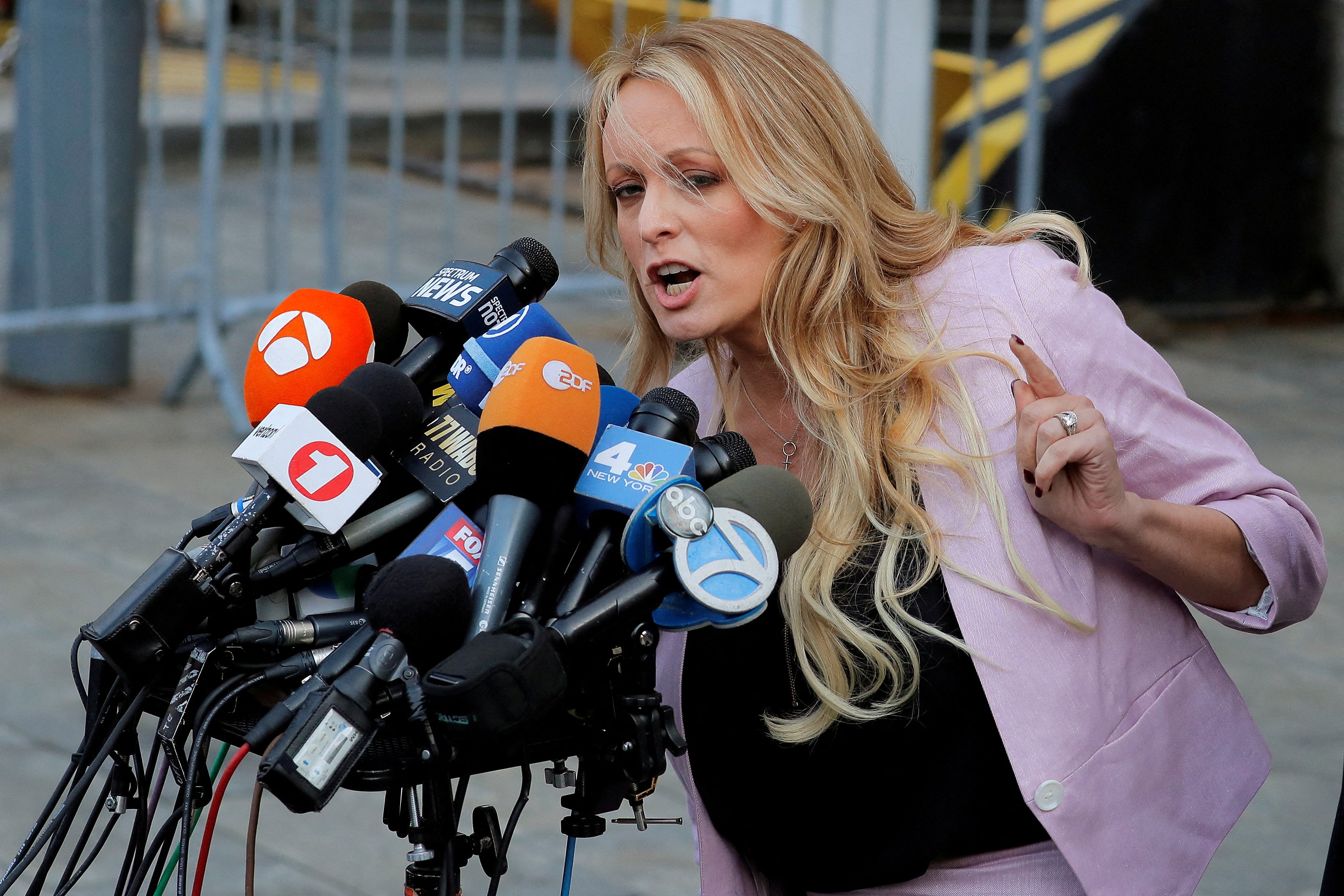
Later that year, Weisselberg pleaded guilty to several tax crimes in what prosecutors called a years-long “systemic” fraud scheme and a “sweeping and audacious illegal payment” arrangement, in which Trump companies paid him generous benefits – including free rent, luxury car leases, and private school tuition for his grandchildren – that were not reported for tax purposes. He was later sentenced to five months in Rikers Island.
In December, a jury also convicted two Trump Organization subsidiaries on tax fraud charges, resulting in $1.6m in fines.
Over the following months, with an investigation picking up steam, Mr Pecker and Cohen testified in front of a revived grand jury investigating Mr Trump’s hush money scheme.
On 30 March, the grand jury presented its indictment against the former president, his first-ever criminal charges in a year that would see more than 90 against him across four jurisdictions.
Outside a Manhattan criminal court on 4 April 2023, a parade of Trump loyalists, conspiracy theorists and right-wing media personalities rallied in his defence as he entered the building for the first time as a criminal defendant.
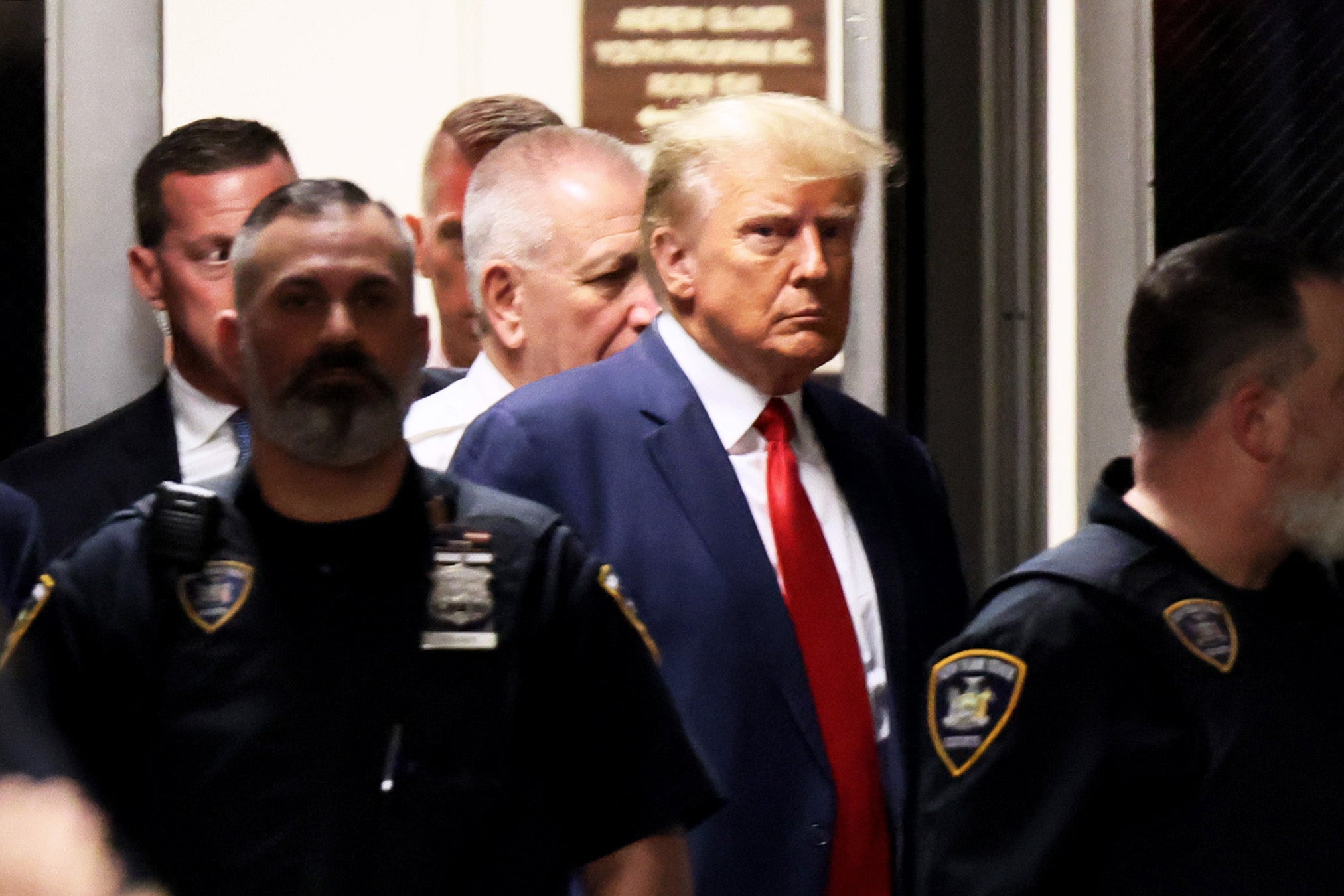
After his indictment, Mr Trump immediately travelled back to his Mar-a-Lago compound to rage against Mr Bragg and the case against him from the comfort of his Florida estate.
“We are a nation in decline, and now these radical left lunatics want to interfere in elections by using law enforcement,” he said. “We can’t let that happen.”
Days later, Mr Bragg’s office received an envelope filled with white powder, among the first in an avalanche of threats from Mr Trump’s supporters intercepted by prosecutors and judges overseeing the cases against him.
The threats to the court
In the months leading up to the trial, as Mr Trump faces an extraordinary number of criminal and civil cases and their Russian nesting dolls of appeals and hearings on his attempts to dismiss and delay his prosecution, he has routinely attacked prosecutors, judges, court staff and others enmeshed in his legal problems, which increasingly are tied to his campaign.
He relies on courtrooms as political theatre to depict himself as a victim of selective prosecution, and his campaign uses his legal drama in countless fundraising messages. Political action committees tied to his campaign have spent millions of dollars of donor money to pay lawyers and legal fees.
Since the New York indictment, there have been “credible threats of violence, harassment, and intimidation directed at the district attorney, his staff, and the District Attorney’s Office”, with “hundreds of threats in the wake of, and connected to, [Mr Trump’s] public attacks,” according to prosecutors in their request for a gag order that blocks Mr Trump from publicly lashing out.
The New York City Police Department logged “an extraordinary surge in threat activity that began on the very day” Mr Trump began targeting Mr Bragg and other New York officials, according to an affidavit supporting a gag order request.
That unit logged 89 threats against the district attorney, his family or employees of his office in 2023, the first of which occurred the same day that the former president called on his supporters to “protest” and “take our nation back”, the filing states.
Police reviewed 600 threatening phone calls and emails in March of last year alone, as the office prepared to indict the former president.
“Defendant has also acknowledged – and reports have confirmed – that his public attacks have incited his supporters to engage in their own misconduct, yet defendant has refused to moderate his comments to prevent such harms,” they wrote.
Mr Trump’s attorneys, some of whom are juggling other criminal cases against him, have filed multiple motions to force the judge to step aside – citing a conflict of interest because of his daughter’s political work – or toss the case altogether on “immunity” grounds, or to drop the “discombobulated package of politically motivated charges” against him, or to move it out of Manhattan or into federal court. Virtually all of those arguments have been rejected.
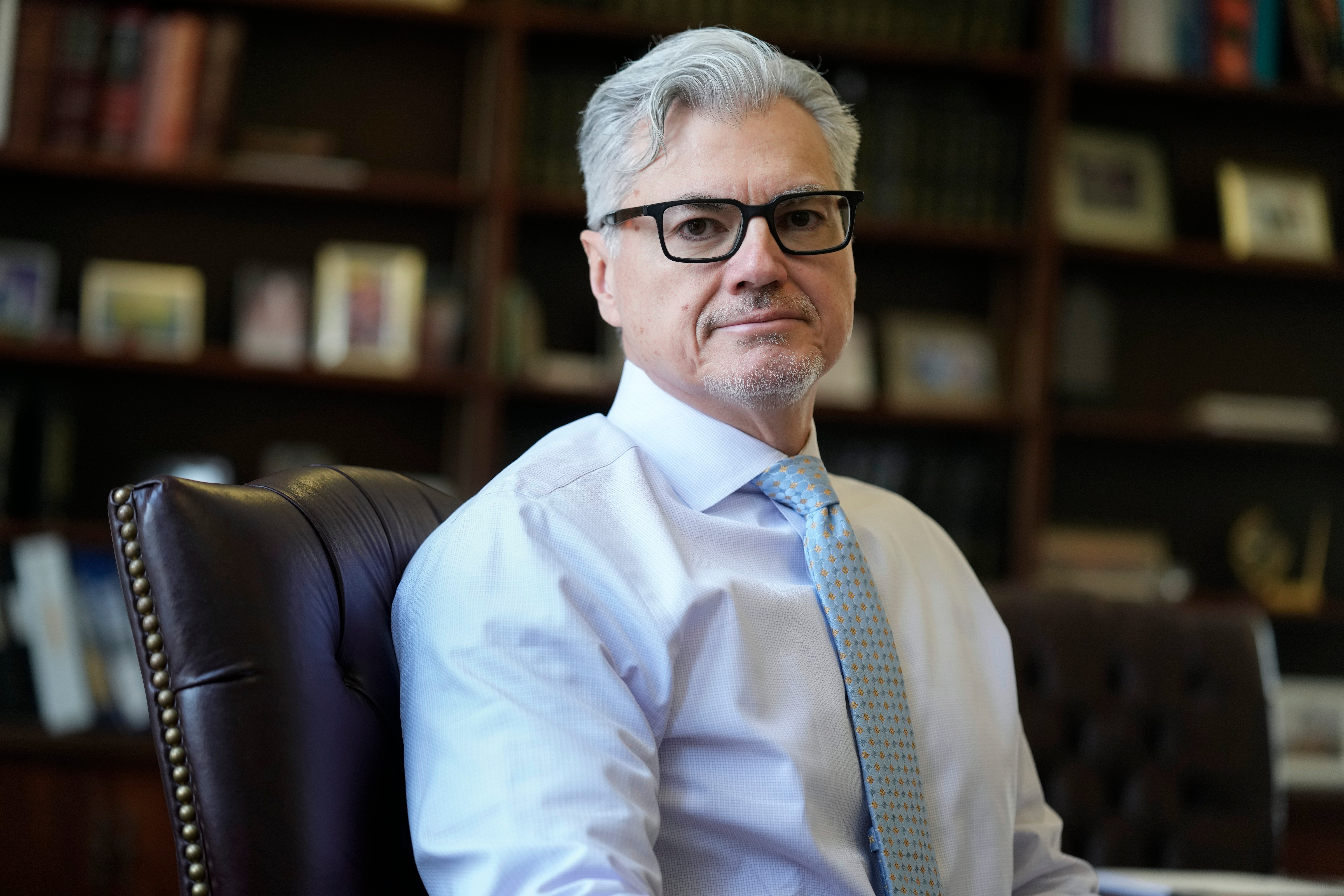
A limited gag order prohibits the former president from public statements “made with the intent to materially interfere” with any work in the case. The judge expanded the scope of the order to prohibit attacks against family members of court staff and attorneys involved in the case, citing Mr Trump’s “very real” threat to the trial’s integrity, after Mr Trump lashed out at the judge’s daughter on his Truth Social media platform.
“The average observer must now, after hearing [Mr Trump’s] recent attacks, draw the conclusion that if they become involved in these proceedings, even tangentially, they should worry not only for themselves but for their loved ones as well,” Judge Merchan wrote.
“Such concerns will undoubtedly interfere with the fair administration of justice, and constitute a direct attack on the rule of law itself,” he added.
The gag order is the third against the former president, including an order that prevents him from disparaging court staff, witnesses and others involved in his civil fraud case targeting his real estate business, and another gag order in his federal election interference trial.
The witnesses
On an episode of her podcast in January, Stormy Daniels said she is “set to testify” in the case. She later told ABC’s The View that she is “absolutely ready” to do so.
Former Trump spokesperson Hope Hicks – press secretary for Mr Trump’s 2016 campaign and an early White House communications aide who allegedly knew about the hush money scheme – is also expected to testify.
In March, days before the trial was initially set to begin, Judge Merchan rejected attempts from Mr Trump’s attorneys to block testimony from Ms Daniels, Ms McDougal and Cohen, who is expected to detail the alleged scheme, in order to corroborate the case from Manhattan prosecutors.
Prosecutors also want jurors to hear the 2005 Access Hollywood tape, which “caused a panic within the campaign” when it was released in the days before the 2016 election, and “served as the catalyst” for securing a hush money scheme to bury stories that could further compromise his election chances.
The judge said he will not allow jurors to watch or listen to the tape, but he suggested that prosecutors can discuss its contents to allege a motive.
Instead, “they’re going to corroborate every little thing Michael Cohen says – big details, small details, anything they can corroborate”, according to Ms Agnifilo, the former assistant district attorney in Manhattan. “This is the same trial team that also successfully prosecuted the Trump Organization … they know what they’re doing.”
If convicted, Mr Trump likely won’t see the inside of a jail cell. He could face up to four years in prison, a penalty that will likely be deferred by his appeal, which is all but expected to follow immediately should a guilty verdict be delivered.
But the case could further plunge Mr Trump into a deepening financial crisis, with additional fines levied against him as he struggles to come up with cash and surety bonds to fight off a mammoth civil fraud judgment and a defamation verdict in the middle of a multimillion-dollar campaign operation.
Days before jury selection was set to begin, Mr Trump’s legal team made three last-ditch pleas to a state appeals court for a trial delay. They were promptly rejected.
“He will not succeed in delaying the trial date,” according to Norm Eisen, former special counsel to the House Judiciary Committee majority during Mr Trump’s first impeachment. “Trump will be forced to confront the thing he rightly fears: a jury of everyday Americans who will likely deliver a criminal conviction for his original 2016 election interference and voter deception attempts to grasp power. Accountability is coming.”